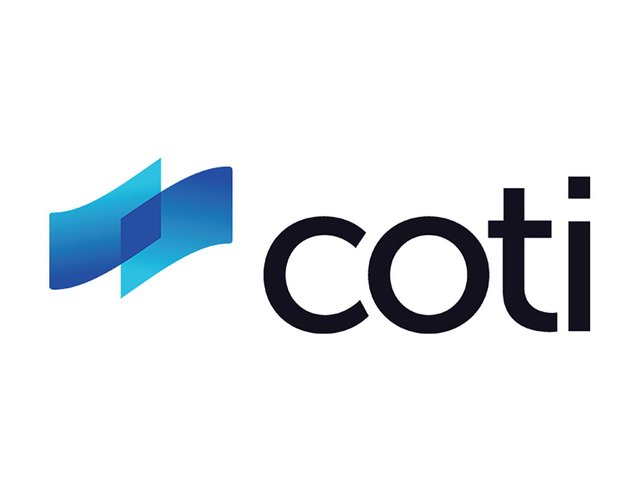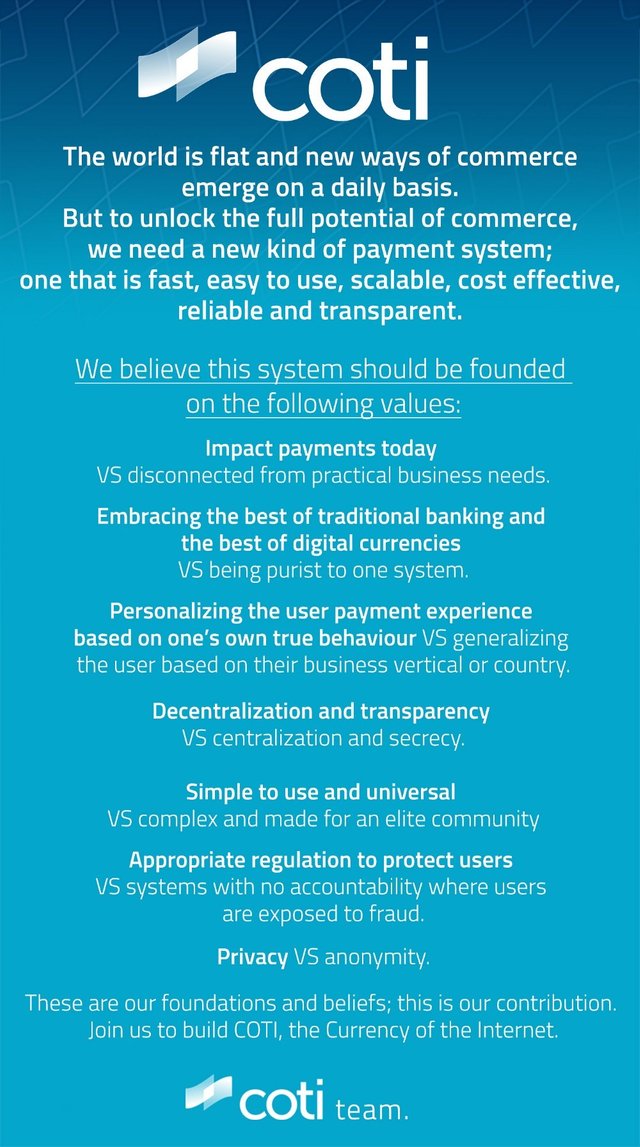COTI - Currency Of The Internet

https://www.coti.io Founded in early 2017 by veterans of the banking and payment industries.
COTI’s CTO, Adam Rabie, is a digital currency expert and previously worked with large multinationals, including IBM, on blockchain projects. COTI is backed by some of the world’s pre-eminent advisors and investors, including Sean Melnick, the Founder and Non-Executive Chairman of Peregrine Group, Dr. Matthew McBrady, a former Managing Director and Chief Investment Officer at BlackRock, Avi Chesed, the Co-Founder and CEO of Processing.com, and Dr. Stefan Hlawatsch, the CEO of Skybridge Investment GmbH.
Everyone involved in the banking and payments industries over the past decade has had a front-row view of how the world is changing – people frequently interconnected, and commerce commonly done across borders. For example, it’s now possible for a taxi driver in Buenos Aires, Argentina, to buy a sofa directly from a furniture factory in Shenzhen, China; or for a housewife in Minnesota, USA, to purchase designer linen from a boutique fabric producer in Milan, Italy.
But the truth is that these types of transactional scenarios are far less commonplace than they should be. The actual quantity of trade happening in the world today – where the buyers and sellers both achieve positive outcomes – falls far short of the potential amount of business that could be taking place. There is an unfathomable amount of pent-up appetite to trade.
The main reason for this untapped potential is not attributable to a lack of logistics, or a lack of marketplaces, or a lack of telecommunications infrastructure. Preferably, it results primarily from one factor: the lack of trust between buyers and sellers.
This lack of trust not only prevents people from trading with one another but, importantly, it also drives up the cost of transacting.
Historically, when all commerce was local, we relied on the social enforcement of trust to provide a sense of security in transactions. When trading within a tribe or village, or even between tribes and communities, the social fabric of our early societies enabled us to gain the confidence to transact with one another freely. If something went wrong, we would be able to approach the other individual to resolve any dispute, face-to-face.
Since the industrial revolution, the information revolution and the advent of our now commonplace payments technologies, the social fabric that traditionally instilled a sense of trust between transacting parties is no longer present – traditional notions of localized trust have not carried over to the globalized economy, an economy in which many transacting sides have never met one another, and may never transact again. This trust deficit persists across all levels of transacting ability: consumer-to-consumer, consumer-to-merchant, and even at the institutional level (e.g., acquirer-to-issuer). Payments companies have taken mediation measures to ease the trust problem, but several points of friction encumber the late payments ecosystem:
1. Dispute resolution practices for dealing with fraud, incorrect shipments and other
instances of ‘something going wrong’ have created an operational burden that is costly
for payments companies to maintain;
2. Low global approval rates persist, though have been partly solved by networks of local acquirer banks;
3. The relationship between merchants and consumers is asymmetric: the consumer pays first in the expectation that he or she will receive the goods. In the event of something going wrong with the transaction, it the consumer’s responsibility to report the issue and file a chargeback complaint.
4. Merchants and consumers are assigned risk-ratings based on broad classifications rather than the actual risk that they pose to the system. For example, legitimate merchants operating in high-risk industries are classified as high-risk by their sector association, while dishonest merchants operating in low-risk areas may organize as low-risk by the same forces.The high mediation costs borne by the payments companies are ultimately passed on to merchants and consumers in the form of high transaction fees and low approval rates.
Nonetheless, high fees inspected as a necessary evil – without high fees and the
associated mediation measures used to instill a sense of trust, people would be warier of engaging in trade than they already are.

WHAT IS COTI?
COTI is a payments transaction network that was built from the ground-up to solve the payments challenges of today. COTI’s ecosystem of applications and services, currently under development, will include consumer wallets, merchant processing tools and a digital currency exchange facility. COTI’s ecosystem will be fueled by its native digital currency, the COTI token (abbreviated as XCT). COTI solutions incorporate the best of traditional payments systems and the best of blockchain technologies and will offer the fastest, easiest, most cost-effective and most trusted way to pay.

WHAT DOES THE NAME ‘COTI’ STAND FOR?
The name ‘COTI’ stands for the ‘Currency of the Internet.' The COTI team believes that, within a few years from now, digital currencies will play a central role in the lives of individuals and merchants everywhere. Our vision is for COTI to become the Currency of the Internet by being the first digital currency to achieve widespread adoption in payments.

WHAT PROBLEM DOES COTI SOLVE?
The world has changed a lot in recent years and new forms of commerce — including peer-to-peer transactions, online marketplaces, and cross-border eCommerce — are becoming commonplace. The existing payments networks are not ideally-suited to dealing with these new forms of commerce. While digital currencies offer the promise of lower transaction fees and higher approval rates, they face scaling challenges and low rates of adoption. Moreover, they are not equipped to deal with the protections that consumers and merchants have grown accustomed. COTI combines the best of traditional payments systems with the best of block-chain technologies to offer a new way for individuals to pay and a new way for merchants to accept payments. And it does this in a way that is faster, easier, more cost-effective and more trusted than existing payments networks.

WHAT IS THE TRUST PROTOCOL?
The Trust Protocol is COTI’s underlying technology. It consists of two main elements: Trust Scoring and Decentralized Mediation. COTI’s Trust Scoring system scores the trustworthiness of individuals and merchants based on their behaviors over time. Merchants with impeccable trust records pay zero processing fees, while merchants with less-than-ideal records incur higher fee settlements.
COTI’s Decentralized Mediation system relies on independent mediators to reach consensus on transaction disputes that occur within the COTI network. This method ensures that disputes resolved in a fair, fast and cost-effective manner. COTI’s mediators paid for their efforts in COTI’s native digital currency.
COTI’s native digital currency, XCT, cannot be mined. However, COTI’s mediators serve a miner-like function within the COTI network. Miners are paid in units of XCT when they successfully reach consensus.

ATTRIBUTES OF COTI
COTI has several characteristics which position it as the first digital currency that is fit for consumer-initiated payments use cases and will enable it to drive down transaction fees, drive up approval rates, and empower the world to unlock its full potential to engage in commerce:
Usable
Through a variety of apps and merchant tools, COTI is simple enough to be used by any consumer and straight-forward enough for any merchant to start accepting.
Zero-to-low fee
Consumers never incur fees when paying with COTI, while merchants incur low-to-zero fees depending on their behavior over time.
Instant
Coti always settles transactions instantly and, like the major card networks, scales to process tens of thousands of transactions per second.
Fraud-resistant
Coti protects end-users from their own errors and from fraud – it’s the first reversible, mediated digital currency.
Compliant
Coti is built on strong regulatory foundations, and is non-anonymous, committed to anti-money laundering, and built to adapt to regulatory changes.

THE COTI MANIFESTO
We want to share our vision with the world. The world is flat and new forms of commerce emerge on a daily basis. But to unlock the full potential of economics, we need a new kind of payment system, one that is fast, easy to use, scalable, cost-effective, reliable and transparent.
We believe this system should found on the following values.

Coming Soon...
Please Share Your Thoughts

Welcome to Steem Community @cotinetwork! As a gentle reminder, please keep your master password safe. The best practise is to use your private posting key to login to Steemit when posting; and the private active key for wallet related transactions.
In the New Steemians project, we help new members of steem by education and resteeeming their articles. Get your articles resteemed too for maximum exposure. You can learn more about it here: https://steemit.com/introduceyourself/@gaman/new-steemians-project-launch
Welcome
This looks promising.
Thank you.
COTI was explicitly designed to apply for payments. It combines aspects of traditional payments with the principles of blockchain technology to provide an instant, secure, low-to-zero cost means of transacting globally. Coti’s addition of a ‘trust layer’ makes it the only digital currency to offer a compelling alternative to existing payments systems – it is the first digital currency to account for mediation, an essential aspect of any successful payments network. With our technology, Transactions are settled instantly on Coti’s transparent, 3rd party- validated ledger.
If either party to a transaction is unsatisfied, a dispute will be resolved by Coti’s mediators.Also, Merit-based fee structure ensures individuals with high trust scores pay no fees to transact. Other projects address specific payment needs, from open digital wallet standard (PROMISE), Crypto GW (COSS) with dispute system (UTRUST) to reputation based system (Monetha). Still, none of them takes a holistic approach to solve the fundamental problems in today's payment landscape.
COTI is built from the ground-up to address payments use cases. It takes a sophisticated behavioral approach to address the absolute necessity of having a provision for mediation, adding a trust layer that incentives honest, trustworthy conduct on the part of network participants. That will result in a low abundant rate on the checkout page, low transaction fees, high approval rates and excellent user experience. Unlike existing market solutions that offer PSP (payment service providers) solutions, COTI solves high-risk merchants core problems. Currently, Merchants and consumers are assigned risk-ratings based on broad classifications rather than the actual risk that they pose to the system. For example, legitimate merchants operating in high-risk industries are classified as high-risk by their industry association, while dishonest merchants operating in low-risk sectors may classify as low-risk by the same forces.
Welcome.
Welcome @cotinetwork
You may like this nice Card. Use it in any way you want: It is a completly free gift for you :)
PS: Some clever Steemians print it for takeaway. The QR-Code leads directly to your blog.
Thank you!
Hello, I am newer to the COTINetwork however my love for the dedication and passion for what you all are creating and bringing forward is unmatched in any other project i've researched or been a part of. Im looking forward to being a part of the COTI Family and helping through any capacity I may be able to.